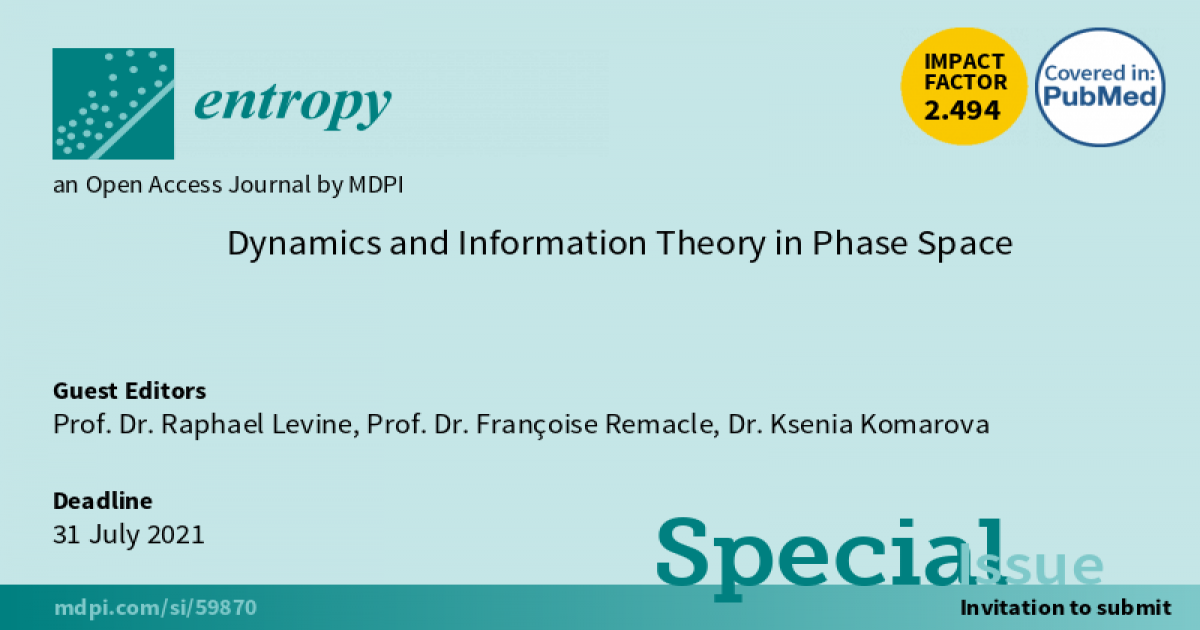- 2.0Impact Factor
- 5.2CiteScore
- 22 daysTime to First Decision
Dynamics and Information Theory in Phase Space
This special issue belongs to the section “Information Theory, Probability and Statistics“.
Special Issue Information
Dear Colleagues,
In this age of big data, a quantitative compact summary of the essential features of the system and how to extract them is needed throughout the sciences. This is especially the case when the system is evolving in time and one seeks to also describe its history. In the more quantitative sciences, the time course requires two ingredients: the law of change and the initial state of the system. The Laplace demon was an early practitioner. The demon had a very definite initial state. Beginning with Boltzmann and Gibbs, phase space is where the incomplete specification of the initial conditions lives and where it is convenient to describe how the system evolves. We need to know how to infer the initial state and how to propagate it in time. As the equation of motion, Boltzmann used a kinetic scheme while Gibbs used classical mechanics. The exponential growth of activities in quantum technologies provides us with novel tools for exploring the sampling of the phase space of complex systems. So, two key aspects of our subject are what methodology generates the time translation and are there ways of learning it. Next, we need to deal with reduction of the size of the problem. Lastly, we have custom-made approaches that have been tailored to the class of systems of interest (e.g., protein folding; what is the reaction coordinate; information transduction in a network). As the number of degrees of freedom grows, computational aspects become of increasing importance. What is the holy grail? Most likely, it is to converge on the function (operator) that generates the time displacement on a reduced level of description. Thermodynamics tell us that under well-defined conditions this is the free energy. How do we generalize it?
Prof. Dr. Raphael Levine
Prof. Dr. Françoise Remacle
Dr. Ksenia Komarova
Guest Editors
Manuscript Submission Information
Manuscripts should be submitted online at www.mdpi.com by registering and logging in to this website. Once you are registered, click here to go to the submission form. Manuscripts can be submitted until the deadline. All submissions that pass pre-check are peer-reviewed. Accepted papers will be published continuously in the journal (as soon as accepted) and will be listed together on the special issue website. Research articles, review articles as well as short communications are invited. For planned papers, a title and short abstract (about 250 words) can be sent to the Editorial Office for assessment.
Submitted manuscripts should not have been published previously, nor be under consideration for publication elsewhere (except conference proceedings papers). All manuscripts are thoroughly refereed through a single-blind peer-review process. A guide for authors and other relevant information for submission of manuscripts is available on the Instructions for Authors page. Entropy is an international peer-reviewed open access monthly journal published by MDPI.
Please visit the Instructions for Authors page before submitting a manuscript. The Article Processing Charge (APC) for publication in this open access journal is 2600 CHF (Swiss Francs). Submitted papers should be well formatted and use good English. Authors may use MDPI's English editing service prior to publication or during author revisions.
Keywords
- algebraic description of phase space
- maximal entropy formalism
- statistical mechanics of learning
- free energy landscape
- barrier crossing dynamics
- dynamics on networks
- coherent control
- dynamical groups
- Markov models
- computing with observables
- dimensionality reduction
- reduced descriptions
- clustering

Benefits of Publishing in a Special Issue
- Ease of navigation: Grouping papers by topic helps scholars navigate broad scope journals more efficiently.
- Greater discoverability: Special Issues support the reach and impact of scientific research. Articles in Special Issues are more discoverable and cited more frequently.
- Expansion of research network: Special Issues facilitate connections among authors, fostering scientific collaborations.
- External promotion: Articles in Special Issues are often promoted through the journal's social media, increasing their visibility.
- Reprint: MDPI Books provides the opportunity to republish successful Special Issues in book format, both online and in print.


